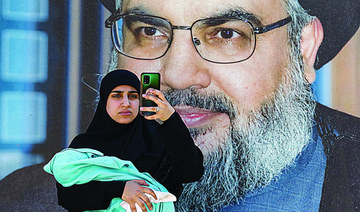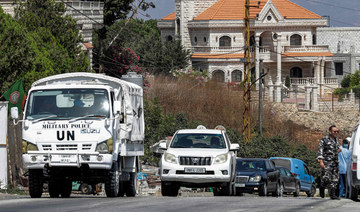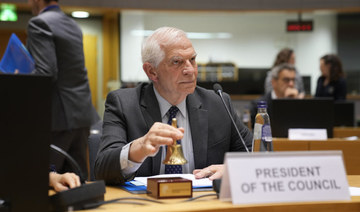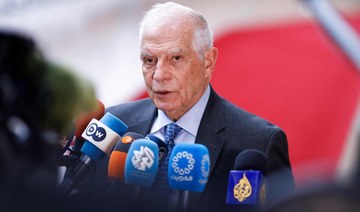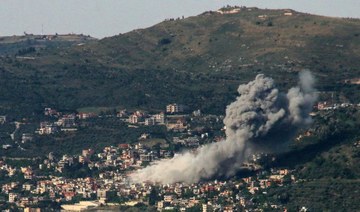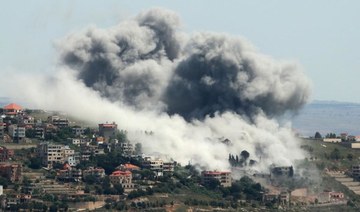BEIRUT: Lebanese authorities arrested four State Security officers on Saturday on suspicion of torturing a Syrian detainee to death.
The arrests came on the orders of the government's commissioner to the military courts, Fadi Akiki, who ordered an investigation into last month's death of Bashar Abdel-Saud in custody.
The killing in southern Lebanon provoked anger, and activists shared photos of his body, which showed signs of torture.
State Security earlier announced that it had arrested a cell affiliated with Daesh in the Bint Jbeil region. The cell had reportedly committed murders in Syria.
Abdel-Saud had a leadership position in Daesh and tried to attack the investigator, according to State Security officials.
BACKGROUND
The killing in southern Lebanon provoked anger, and activists shared photos of the detainee’s body, which showed signs of torture.
They said security officers detained him to calm him down, but he suffered a heart attack and was transferred to hospital where he died.
An investigation was opened into the incident, and Akiki decided to arrest the officer and three State Security members investigating the network.
The forensic doctor who examined the body issued a report refuting claims that Abdel-Saud had died of a heart attack.
The victim had suffered bruises, severe wounds, burns, and physical abuse, the report added.
Politicians condemned his death on social media, prompting a source in the General Directorate of State Security to announce that investigations were underway to uncover the circumstances behind his death.
The source added that the victim and other detainees were affiliated with Daesh.
Under judicial orders, the directorate will publish their documented confessions about their affiliation with the terrorist group, according to the source.
Caretaker Environment Minister Nasser Yassin said it was time to approve the National Human Rights Commission’s regulations, which stipulate prohibiting torture and punishing perpetrators.
He said what had happened with the Syrian was a crime that violated human rights.
He added that the Public Prosecution was required to conduct a serious investigation by the civil judiciary, not the military judiciary, and to respect the principles of an investigation into crimes of torture.
The head of parliament’s Human Rights Committee, MP Michel Moussa, said: “This is a heinous crime against a human being, regardless of his nationality or affiliation.”
Moussa called for holding accountable all those who had abused their powers and violated the law.
He said that Lebanon had ratified the Convention against Torture adopted by the UN General Assembly, and later the Optional Protocol, and approved Law 65 of 2017 relating to the punishment of torture and other cruel, inhuman, or degrading treatment or punishment.
Moussa said Lebanon had also set up the National Human Rights Commission, which includes a committee against torture.
But Moussa said the authorities were failing to provide everything that would allow the commission to start its work.
MP Melhem Khalaf, former head of the Lawyers Syndicate, said: “We have strived to amend Article 47 of the Code of Criminal Procedures and made it mandatory for a lawyer to be present during the preliminary investigation. One of our objectives was to prevent any torture during the investigations.”
MP Michel Douaihy said the case could not be ignored without holding those responsible accountable and addressing the issue of torture.
The MP urged the head of the committee to invite the interior minister and the director general of State Security to its next meeting to investigate and take the necessary measures against the perpetrators.
The legal department for the Justice Pioneers Group, a human rights activist body, said the victim did not die from a heart attack.
The group said it had information to believe the detainee was tortured and his neck was broken, adding there was a criminal intent to kill.
It alleged that the officer and members of State Security had shown what it termed "brutal behavior" when they were supposed to respect legal principles in conducting preliminary investigations and looking for clues.
The Justice Pioneers Group also claimed the investigators had violated the law and their obligations, especially those stipulated in Article 41 of the Code of Criminal Procedure.
These state that an officer may question the suspect provided the latter makes his statement of his own free will in full knowledge of the facts and without being subjected to coercion. If he decides to remain silent, he may not be forced to speak.




